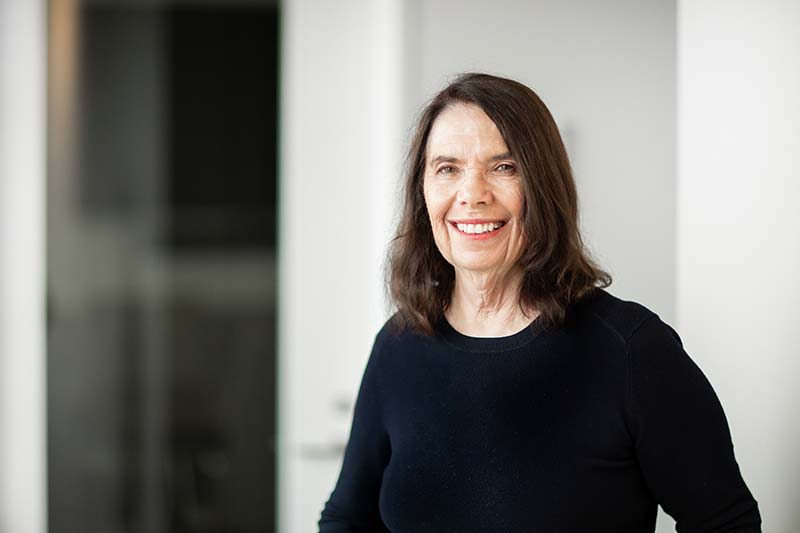Ita Gordon, 84, Brought Passion and Expertise to Her Work with Testimony

The USC Shoah Foundations mourns the passing of friend and colleague Ita Gordon, an indexer, translator, mentor, and researcher who, for nearly thirty years, channeled her passion for testimony into diligent care and expertise that helped the organization become a world leader in collecting, preserving, and sharing Holocaust survivor testimony.
In her three decades with the USC Shoah Foundation, Ita indexed or reviewed more than 4,100 interviews – around 9,000 hours – with survivors and witnesses of the Holocaust and other atrocities. She mentored dozens of staff members, researched documentaries, books, and other projects, and helped define and refine the keywords that make testimonies accessible worldwide.
“Few know the depth of the archive as well as Ita. Her encyclopedic knowledge of our collection is why so many of us turned to Ita for guidance on how to find particularly compelling personal histories, which she was always eager to provide,” said Dr. Robert Williams, Finci-Viterbi Executive Director of the USC Shoah Foundation. “Ita’s dedication to our mission, her love for the survivors, and her unparalleled knowledge of the archive make her name nearly synonymous with the USC Shoah Foundation. Her guidance was always invaluable, kind, and right on point, and we will feel her absence profoundly.”
USC Shoah Foundation Curator Crispin Brooks, who worked closely with Ita for more than two decades, said that at the core of Ita’s dedication was a love for the archive and the voices it contains, and a deep belief in the good that comes from sharing those voices with the world.
“She cared so much about the survivors and their experiences, and about the people who worked with testimony,” said Brooks. “Her imprint is everywhere in this organization. We are who we are today because of the talent and quiet hard work that Ita – and others – have poured into creating and growing this archive.”
Ita joined what was at the time Survivors of the Shoah Visual History Foundation in 1995, soon after the organization was established to record 50,000 oral histories of survivors and witnesses of the Holocaust.
Raised in Brazil by Yiddish-speaking parents, Ita spoke Portuguese, Spanish, Yiddish, and English. She was a trained translator, which made her an agile staff member in the USC Shoah Foundation’s early years.
As interview tapes came in from location sites, Ita worked with cataloging teams in trailers on the backlot of Universal Studios, watching hours a day of Holocaust survivor and witness testimony. Indexers attached keywords to make the testimonies searchable segment by segment, including names of people and places, specific historical events, or common experiences.
Ita stepped in wherever she was needed, fielding phone calls and nurturing relationships with Holocaust survivors, going above and beyond to meet their requests.
She was instrumental in establishing collection efforts in Brazil, where the USC Shoah Foundation recorded close to 600 testimonies, and she later helped broaden the effort to other Latin American countries.
After indexers completed work on most of the initial batch of 52,000 testimonies, Ita stayed on when the Shoah Foundation moved to the University of Southern California in 2006, applying her skills and commitment in an array of areas.
She worked on research projects for filmmakers and scholars, helped develop and run training for indexers, and followed up with one-on-one mentorship and guidance that was both exacting and kind. She worked on streamlining the index and adapted her skills when the institute expanded to collect testimonies related to genocides in Rwanda, Armenia, Guatemala, Bosnia, and others.
Brooks said Ita connected deeply with survivor testimonies, absorbing and recalling details of the interviewee’s experiences and emotions.
Staff members and researchers relied on Ita and her encyclopedic knowledge to mine the archive for the perfect testimony or clip for a classroom resource, a scholarly project, a public presentation, or a social media post.
Ita’s legendary recall allowed her to draw connections between interviewees, including a headline-making reunion in 2020 after she reunited childhood friends from Berlin who hadn’t realized the other had survived.
“I have had the rare privilege to see the breadth of humanity as well as the details of each person’s life,” Ita said when the USC Shoah Foundation celebrated its 20th anniversary in 2014. “Minute by minute, the keywords provide a way for families, scholars, and students to find wonderful moments of insight and truth.”